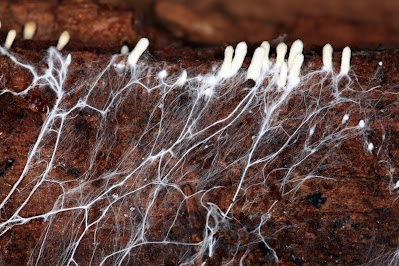Mycelium is a root-like structure of a fungus consisting of a mass of branching, thread-like hyphae. In most fungi, hyphae are the main mode of vegetative growth, and are collectively called a mycelium. Mycelia often grow underground but can also thrive in other places such as rotting tree trunks. A single spore can develop into a mycelium. Mycelium is usually hidden from sight underneath soil or rotting logs.
Mycelia are very important to soil. They break down organic material, making its raw materials available again for use in the ecosystem. Mycelium helps to keep a solid structure in soil, reducing erosion, and creating fertile and nutrient-dense soil. Mycelium also removes industrial toxins and helps trees become more drought-resistant and cleanses groundwater of contaminants and pollutants.
In the garden, mycelium helps to increase nutrients available to plants, improves water efficiency, reduces erosion by acting as a cellular net, and promotes root growth by adding oxygen to the soil and releasing nitrogen, phosphate, and other micronutrients. Mycelium also helps to protect plants against pathogens by competing with pathogenic fungi and bacteria and encouraging beneficial bacteria growth.
Research has shown that mycelial networks play an essential role in the functioning and structuring of plant communities, providing a reliable component to revegetation. In agriculture, mycelium can be used for bio-fertilization and soil regeneration, as it is essential in converting biomass into compost. The revelation that resources are shared between plants through the mycelium is likely to fuel great innovation within agriculture related to nutrient sharing and allocation across field plots. Understanding and harnessing the mycelium may well create overall reductions in external nutrient (fertilizer) applications in the future, creating healthier soil and less contaminated groundwater.
The next agricultural revolution is here, as food systems are becoming less reliant on animals as fermentation technologies for plant-based products expand. The potential exists for the next generation of fermented food products to be created through mycelia and fungi. The potential of fungi to improve agricultural production is great, therefore it is very important for those who grow mycelium to share this technology with farmers.


